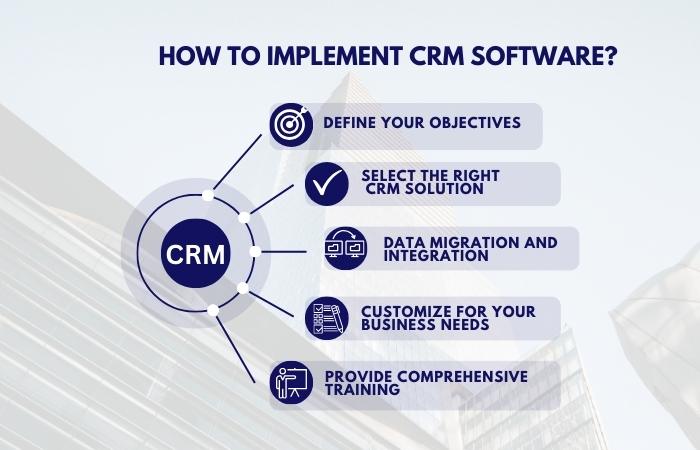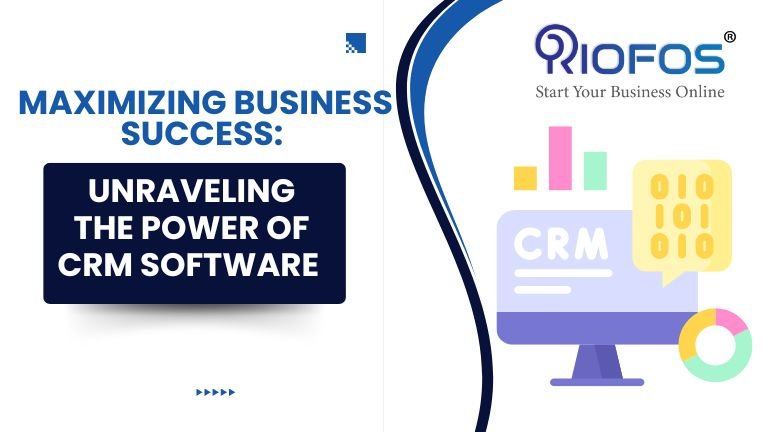In today’s fast-paced business landscape, establishing and nurturing strong customer relationships is crucial for sustainable growth and success. This is where Customer Relationship Management (CRM) software steps in as a transformative tool that can revolutionize the way you manage interactions with your customers. In this blog, we’ll delve into the world of CRM software, exploring what it is, how to implement it effectively, and the multitude of benefits it can bring to your business.
What is CRM?
Customer Relationship Management, commonly known as CRM, is a technology-driven approach that facilitates the management of interactions and relationships with your customers. It involves using specialized software to streamline various aspects of customer-related activities, including sales, marketing, and customer support. At its core, CRM aims to centralize and organize customer data, allowing businesses to gain valuable insights and deliver personalized experiences.

How to Implement CRM Software?
1. Define Your Objectives and Goals:
Before diving into CRM implementation, it’s crucial to outline your specific objectives. Whether it’s improving customer satisfaction, increasing sales, or enhancing marketing efforts, having clear goals will guide your CRM strategy.
2. Select the Right CRM Solution:
Choosing the right CRM software is a critical decision. Consider factors such as the size of your business, industry-specific requirements, and integration capabilities with your existing systems. Cloud-based CRM solutions offer scalability and accessibility, making them a popular choice for businesses of all sizes.
3. Data Migration and Integration:
Efficient data migration is key to a successful CRM implementation. Ensure that existing customer data from various sources is accurately transferred into the CRM system. Additionally, integrate the CRM software with other tools and platforms used within your organization for seamless workflow and data synchronization.
4. Customize for Your Business Needs:
Tailor the CRM software to align with your specific business processes and workflows. Customize fields, forms, and automation rules to ensure that the CRM system fits seamlessly into your existing operations.
5. Provide Comprehensive Training:
Empower your team with proper training on how to use the CRM software effectively. This includes understanding data entry, managing customer interactions, utilizing reporting features, and utilizing automation tools.
What are the Benefits of CRM Software?
1. Enhanced Customer Engagement:
CRM software enables businesses to engage with customers on a more personalized level. By centralizing customer data, you can track interactions, preferences, and purchase history, allowing for targeted marketing campaigns and tailored communications.
2. Improved Sales and Revenue:
With CRM, sales teams can efficiently manage leads, track opportunities, and monitor the sales pipeline. This leads to more effective sales processes, higher conversion rates, and ultimately, increased revenue.
3. Streamlined Marketing Efforts:
CRM provides valuable insights into customer behavior and preferences, allowing for more targeted marketing campaigns. Automation features also enable the scheduling and tracking of marketing activities, leading to improved campaign effectiveness.
4. Enhanced Customer Support and Retention:
CRM systems facilitate efficient customer support by providing quick access to customer information and interaction history. This enables support teams to address queries and issues promptly, leading to higher customer satisfaction and retention rates.
5. Data-Driven Decision Making:
With robust reporting and analytics tools, CRM software provides valuable insights into customer trends, sales performance, and marketing ROI. This data-driven approach empowers businesses to make informed decisions and refine strategies for better outcomes.
How CRM Software Benefits Your Business:
1. Efficient Customer Data Management:
CRM software serves as a centralized hub for all customer-related information. This streamlines processes, eliminates data silos, and ensures that everyone in your organization has access to up-to-date customer data. This efficiency leads to quicker response times and more personalized interactions, ultimately enhancing customer satisfaction.
2. Increased Productivity and Time Management:
By automating routine tasks like data entry, lead assignment, and follow-ups, CRM software frees up valuable time for your team. This enables them to focus on high-priority activities, such as building relationships with prospects and providing exceptional customer service.
3. Improved Sales Forecasting and Planning:
With CRM, you gain visibility into your sales pipeline, allowing for more accurate forecasting. This insight empowers you to make informed decisions about resource allocation, inventory management, and sales strategies, ultimately leading to better revenue projections.
4. Targeted Marketing Campaigns:
CRM provides valuable insights into customer behavior, preferences, and purchase history. This data enables you to segment your customer base and create highly targeted marketing campaigns. By delivering relevant content and offers, you increase the likelihood of conversions and customer retention.
5. Enhanced Customer Retention and Loyalty:
A satisfied customer is more likely to become a loyal, repeat customer. CRM software helps in identifying opportunities to nurture existing relationships, whether through personalized follow-ups, special promotions, or timely support. This proactive approach strengthens customer loyalty and encourages long-term partnerships.
6. Quick Issue Resolution and Customer Support:
CRM equips your support teams with the tools they need to provide efficient and effective customer service. Access to complete customer profiles and interaction history allows for quick issue resolution, leading to higher customer satisfaction rates and a positive reputation for your business.
7. Strategic Decision-Making:
With comprehensive reporting and analytics features, CRM software provides actionable insights into various aspects of your business. These insights empower you to make strategic decisions based on real-time data, ensuring that your business remains agile and competitive in a rapidly evolving market.
8. Facilitates Growth and Scalability:
As your business expands, so do your customer base and operational needs. CRM software is designed to scale with your business, providing the flexibility and functionality required to support your growth trajectory.
Conclusion
In summary, CRM software is not just a tool; it’s a strategic asset that empowers your business across various facets. From nurturing customer relationships to optimizing operations and driving revenue, CRM plays a pivotal role in maximizing your business’s potential for success. Embracing this technology can be a game-changer, propelling your business towards sustained growth and prosperity.
